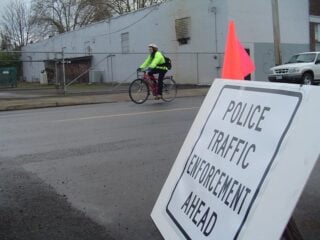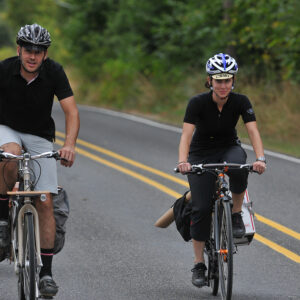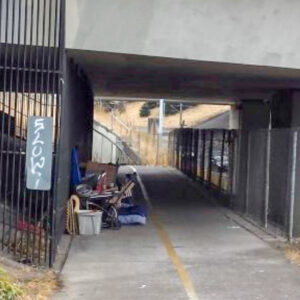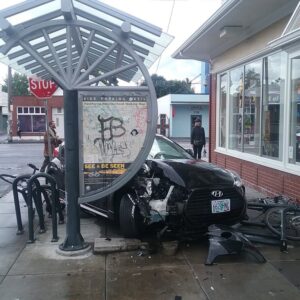
As our community continues to grapple with a spate of deadly and serious injury collisions, much of the discussion in the past few days has focused on enforcement.
It’s an important topic that deserves a productive debate.
Out of around 260 comments in this shortened week (I was out of town Monday-Tuesday), here are three that stood out:
Reader MTW had this to say in response to our story about North Fessenden:
“Even if I thought a city could “enforce” their way to road safety, Portland quite clearly can’t. We’re broke (currently proposing to close parks and community centers) and already under-staffed at PPB. Designing unsafe road conditions and then trying to use police man hours to ticket their way out of the problem is ineffective, wasteful and almost certainly inequitable.
The streets need to be re-designed in a way that forces compliance (with or without agents of the state being there to drive compliance rates.) Unfortunately, people will drive as fast as THEY feel safe and that high threshold for personal safety (particularly in an SUV) is incompatible with a safe and welcoming environment for VRUs [vulnerable roadway users].
2 people have died in 24 hours, treat this like the emergency it is. Until we can afford to re-engineer these streets properly (with concrete, diverters, re-painting, etc.,) break out the orange cones and take some lanes out. Tactical urbanism and traffic calming.”
Advertisement
Scott Kocher added this comment to our story about Police Chief Outlaw’s calls for more enforcement:
“In the past PPB has not supported automated enforcement. A PPB Sergeant once told me we didn’t have enough officers but he opposed automated enforcement because it ‘lacks the human touch.’ I hope in the current climate we can free up officers so they’re not doing tasks a camera can do, placement can be reviewed for equity and safety need, fines can be graduated based on income as elsewhere, and revenue (if there is any) can go to infrastructure.”
And reader SD had an opinion about the PPB’s communications:
“One immediate improvement would be for all communications from the Portland Police and all other city agencies to stop “both-siding” their street safety message. Across the board, the data show that driver behavior contributes to pedestrian injury and fatality far more than that of pedestrians. Despite this, many people as well as many media outlets believe that the cause is distracted pedestrians. If there is any point to making a public statement like the one from Outlaw, it is to give drivers pause to consider if they are driving in a way that is more dangerous than it needs to be. When the PPB calls out pedestrian behavior, it is interpreted by many drivers to mean that their windshield-biased notion that it’s the victim’s fault is true. And, since they already consider their driving habits safe, regardless of whether they speed or drive while looking at their cell phones, this message just reinforces their idea that every thing they do is fine, because nothing bad has happened to them yet, or if it has it was just once or twice.
Statements like these show that very few in Portland government have taken the very first baby steps of understanding Vision Zero that include, at the least, making statements that target the most harmful factors in road safety.”
I’m grateful for these perspectives. Thank you for taking time to share your thoughts. And remember, I rely on you to nominate great comments by leaving a reply that includes “comment of the week” so I can more easily find them via search.
— Jonathan Maus: (503) 706-8804, @jonathan_maus on Twitter and jonathan@bikeportland.org
Never miss a story. Sign-up for the daily BP Headlines email.
BikePortland needs your support.







Thanks for reading.
BikePortland has served this community with independent community journalism since 2005. We rely on subscriptions from readers like you to survive. Your financial support is vital in keeping this valuable resource alive and well.
Please subscribe today to strengthen and expand our work.
MTW says “we’re broke,” which is true. The he goes on to say we need to re-design and re-engineer our streets, but doesn’t offer any way to pay for it. Here’s some suggestions: Tax the rich, no more tax giveaways to developers, actually use cops to enforce traffic laws with heavy fines and vehicle confiscation, congestion pricing. Anybody care to add to the list without whining about how we can’t do these things?
MTW says, right at the end of the comment:
“Until we can afford to re-engineer these streets properly (with concrete, diverters, re-painting, etc.,) break out the orange cones and take some lanes out.”
I wouldn’t call that “whining about how we can’t do these things.”
I (like MTW, other commenters, and Commissioner Hardesty) am skeptical of the idea of “us[ing] cops to enforce traffic laws” and not generally in favor of more policing as a solution to anything. Moreover, unless we assume that all the poor drivers are wealthy, suggesting “heavy fines and vehicle confiscation” is going to inequitably target people who can’t afford it. The goal is to encourage better driving behavior, not to cause people to go into debt or lose their jobs because they made a mistake.
Traffic cones and tactical urbanism sound like great ideas from MTW. May a thousand Better Naitos bloom!
https://en.wikipedia.org/wiki/Day-fine
Someone smarter than me can chime in and educate; what type of impact does Measure 50 have here? Is this a factor at all?
PPB needs to use the cell phone detectors/recorders to spot and issue tickets like Washington police use. HWY 26 around the zoo would be an ideal place to detect all of the blacked out contractor pickups, and SUV’s with drivers texting and using their cell phones. One or 2 officers could , combined with video camera’s issue at least 3,000 tickets per shift. At $1000 per ticket PPB could well afford a full police force in a few weeks to compensate the time they would be in court presenting the evidence.
Can you explain the cell phone detector thing? wouldn’t it just constantly go off because everyone has a phone? I’m interested in learning more about it. Thank you.
There seems to be a disconnect between what the standard fine is, what the judges actually fine and the small percent that ends up in Portland coffers.
I do not understand the debate about enforcement and the fear of targeting minorities.
This city is about 90% white and about 90% of the people who almost run over me are white.
Can we just ticket them?
Bonus tickets for people with “Share the Road” plates who roll their mv through a crosswalk while looking to their left. You know who you are.
More often than not, I’m not sure of the gender of the driver or how many people were in the car that blew through the stop sign or made a right-hook turn in front of me after having passed me two seconds before.
The atmosphere in Portland and much of this country is that motorists need not concern themselves with bicyclists or pedestrians (they rank just above bugs that splatter their windshields).
I don’t care about the gender, race, economic status, disability or anything else; I just want to be safe while riding my bike and want the driver to obey the law and exercise due care.
I, like many others, think the non-enforcement of traffic laws, as well as the implied victim-blaming language of PPB statements, has contributed to the behavior of motorists and decreased the safety of bicyclists and pedestrians.
I want equal opportunity enforcement. I can’t be on the road, sidewalk, or bike lane for 15 minutes without seeing a serious traffic violation. I don’t notice the personal attributes of the driver, I don’t think cops would either.
Let’s try some enforcement. We’ve tried non-enforcement and the results have been devastating.
“I don’t care about the gender, race, economic status, disability or anything else…”
Let me guess – you are a white male.
I am too, but I’ve begun to realize that the privileges which come with that prevent me from appreciating what (in this instance) the repercussions of biased policing are. We can keep stomping our white male feet and insisting that our safety, laws, enforcement are more important than the widely understood and profound problems with policing-as-it-actually-is-done, but I certainly hope we can do better than that.
Would you please cite some real data for me?
Some actual facts about who is being pulled over? Those statistics are available and since NO ONE is being for anything that I can see and people are being killed our streets, I am a lot more concerned with enforcement.
I am tired of the subject.. our streets are dangerous and as cyclist I could care less about who is being pulled over.
I am sick of speeding and general complete non enforcement.
Give us a break with all the sanctity.
Feel free to skip the outrage, the high and mighty tone.
The evidence is not hard to find.
Took me 12 seconds:
https://pamplinmedia.com/pt/9-news/343183-222766-the-high-cost-of-being-black-in-multnomah-county
The article spoke to people being fined….
I think people being run over and killed is a bigger problem.
You don’t agree.
And there is much more. You just have look, and keep an open mind:
https://www.washingtonpost.com/news/opinions/wp/2018/09/18/theres-overwhelming-evidence-that-the-criminal-justice-system-is-racist-heres-the-proof/?utm_term=.bc924c03dd3e
Not every police stop is biased. Minorities of all persuasions are perfectly capable of behaving poorly.
And behaving well.
Do you disagree that policing in this town and across the country is profoundly biased?
I would be surprised if you did, since the police themselves admit as much.
So why then spend your energies here imagining these hyperbolic scenarios, arguing or pretending to argue over whether all (no one said this), many, few, or none of the police-public interactions are biased?
I asked for some statistics about who is being pulled over.
You gave none as usual.
More platitudes.
How many people have to be killed on our streets?
You are not operating here in good faith. I gave you hundreds of studies, 99% of which point to racist policing, unfair and unjust outcomes from our institutions. If you still wish to claim that in Multnomah Co. being pulled over is free of bias why don’t *you* show me the research, the study, the findings which show this to be the case.
Would it help if I reposted the data I’ve seen on the racial composition of people pulled over by the traffic division? What I’ve seen is data published in the Oregonian; if you have a better source, I’d like to see it.
My comments are held back here and not posted in real time so I replied before your post.
You still seem to that some bias by the police is more important than the deaths of 33 people just last year on the streets of Portland…
I just think you are wrong…
You are mistaken. I never agreed to that framing; I consider that framing deplorable and an embarrassment. Are you really suggesting we have to choose between racist policing (as detailed exhaustively in the links I’ve already supplied) and (Vision) zero deaths on our streets? That would be an absurd and pathetic state of affairs.
You (and others) here are eager to champion enforcement, because deaths. And being white and male you are on rthe cord as being emphatically disinterested in the messier issue of racial profiling that even troubles the PPB, and which may or may not be preventing the kind of enforcement (which let’s not forget is not the same as zero deaths) you are championing here.
White priorities have almost always carried the day. If we follow your (collective) advice here in the comments we would seem to have learned nothing about how power and inequality and racism work,mthat roles they have played in getting us to this point. A healthy dose of humility, of listening, of giving someone who doesn’t look like (I am going to assume) you and me the microphone, wouldn’t hurt at all right about now.
Huh, since you have no idea what race I or anyone else here is , I suggest a bit of humility form you…..
You just assumed I was white. nice profiling on the internet.
You also assumed I was male and you have no idea of that…
I would careful with all your long thought assumptions about who people
are you engage with here.
You make a lot of sweeping generalizations about the BP audience I think.
What about the widely understood and profound problems of not enforcing traffic laws in neighborhoods where people are dying? Engineering may be the best long-term solution, but we need something in the immediate-term to reduce the body count.
I’ve seen no evidence that non-pretextual traffic policing is a greater problem than the fatalities of the past few weeks.
“I’ve seen no evidence that non-pretextual traffic policing is a greater problem than the fatalities of the past few weeks.”
Yes, but what your framing elides is the fact that the communities that do not trust the police (and have every reason not to) and the individuals and communities who suffer the most from traffic violence are not the same. There is overlap, to be sure, but as I have said here before I think we should hold ourselves and our police to a higher standard; refuse to accept bias in the name of ‘safety,’ which your comment seems to suggest we do.
What does this say about our society that we can’t get a handle on *either* of these problems? That in a supposedly wealthy and democratic society our racist policing _and_ our traffic carnage statistics are near the top of international lists?
I too have said we should hold the police to a higher standard. I do not believe that effective policing needs to be, or even can be, biased. Simply withdrawing the police is no solution. (ref Baltimore)
Non-pretextual traffic stop data in Portland does not suggest a major problem with bias. Do you believe the fear of bias from people being pulled over for speeding or running a red light (cases where people know good and well what they did) is more important than people actually dying?
Automated enforcement could work, but will take time to set up (as laws will need to be changed). What do you propose in the meantime?
“Non-pretextual traffic stop data in Portland does not suggest a major problem with bias”
Bias, racism, abuse of the less fortunate permeates the entire system from top to bottom. I really don’t know how you draw (much less focus on) conclusions that contradict that.
“Do you believe the fear of bias from people being pulled over for speeding or running a red light is more important than people actually dying?”
I don’t think this is a helpful way to frame this matter, but to answer your question I think we should ask members of communities who don’t look like us, whose experiences may be very different from ours, and who have a greater stake in certain aspects of this.
“What do you propose in the meantime?”
(1) A fundamentally rewritten, renegotiated collective bargaining agreement between the City and the Police Union, which incorporates accountability throughout, that instantiates conduct which we all might agree is essential for justice to be meaningfully served in our community.
(2) communication from the PPB that differs from what we keep seeing (both sides, etc.) and which establishes why enforcement will look like, what behaviors will be deemphasized (stop signs in Ladd’s) and which will receive attention (motor vehicle operator speed, inattention, aggression), along with how this enforcement will be conducted to avoid racist distribution of necessarily limited resources.
Those are great suggestions. Until that get, I’m not going to assume drivers will see me.
“Do you believe the fear of bias from people being pulled over for speeding or running a red light is more important than people actually dying?”
Put another way –
We here generally agree that, basically, everyone driving speeds at some point;
we also, generally agree that resources (here, cops) are limited;
furthermore, we now understand that blacks in the US and in Multnomah Co. are and have always been pulled over, harassed, abused, profiled, shot at disproportionate rates than whites.
So simply suggesting, as you are, that we contrast people being pulled over more with the traffic violence statistics without accounting for how this all shakes out seems at best tone deaf.
What we don’t know (or at least I don’t know) is how much of the profiling, abuse, and harassment, and shooting comes from routine (i.e. actual, non-pretextual) traffic enforcement. What I do know is that the published traffic division data I’ve seen does not suggest the same level of problems as the overall police force.
I will of course reassess if I find better data.
I liked these related readings:
https://www.strongtowns.org/journal/2019/4/15/strong-towns-and-race
https://www.strongtowns.org/journal/2017/10/31/the-routine-traffic-stop
Traffic stops aren’t a problem just for civilians, they are also a problem for cops…a lose-lose situation. That much more reason for design, engineering, technical, and societal solutions – not exclusively, but prioritized.
Not to mention, getting run down while walking by a boozed-up, phone besotted, or street racing driver happens to people of all colors!!
Tactical Urbanism does not necessarily equal demo projects. Getting a diverse bunch of activists, planners, and engineers over beer at Lucky Lab to discuss what to do is a good form of Tactical Urbanism. Getting PBOT to do a demonstration project is not – it’s simply a demonstration project.
That said, I’d suggest:
– Portland do a simulation of a 9.5 earthquake and randomly close off bridges, block both local and arterial roads with random piles of gravel and old asphalt, and throw a few bloody mannequins randomly about.
– The city borrow/rent wrecked cars from the local chop shops to place along every high-crash corridor, not in the parking strip, but along the center turning lanes and on medians. They could even paint them white and call them “ghost cars.”
– Any roadway or bike project that the city has funded but is delayed in construction, put orange cones where construction will occur, even if it’s a few years (or decades) out.
Comment of Week
Seems we have a real social equity puzzle here. Enforcement is seen by many social justice advocates as disproportionately impacting non-white drivers, but Portland’s high-accident corridors, such as 82nd, outer Division and outer Powell, are places with higher proportions of communities of color and who thus end up being disproportionately impacted as pedestrians (or on bicycles, if they dare). But, there are also probably more drivers who are people of color in these areas, so enforcement would probably have a disproportionate impact on non-white drivers, even with enforcement by automatic cameras. But, focusing on safer bike infrastructure is criticized as a white-centric approach (Adonia Lugo and others, who say it ignores the fact that this ignores concerns of non-white people who are deterred from walking or biking from being more visible and vulnerable from harassment from police and others in the community). So, if both enforcement and infrastructure improvement are white privilege approaches, what can be done?
My take is that something must be done (I happen to be the child of an immigrant from Asia).
I think we do need both safer infrastructure and more enforcement, but this enforcement needs to be targeted to focus on the most dangerous infractions. Not doing enforcement especially impacts walkers and bicyclists in lower-income communities such as in East Portland, and the communities of color that live there. Improving safety for the vulnerable users of our streets must be the priority.
Enforcement could focus on the most dangerous violations, like running red lights and stop signs, speeding, and not yielding for pedestrians. To help address bias, enforcement could ignore or only give warnings for things like burnt out tail lights or not signaling (which have sometimes been used to target black motorists). I recently saw a luxury SUV blow through a red light at speed with a police car at the intersection with pedestrians around – nothing happened. This shouldn’t be.
Again, we must have both safer infrastructure and carefully targeted enforcement to improve safety for everyone.
A public conversation, kind of like what we are having here, but with cops and representatives of the profiled groups at the table as equals could go a long way toward identifying and agreeing on solutions. But that isn’t how we (much less the PPB) tend to do things.
Seeing these conversations devolve into this same back and forth every time is so frustrating. Is traffic enforcement really this complicated in 2019?
The whole thing just feels like throwing the baby out with the bath water. If PPB has bias issues I don’t see why the correct answer is stopping all traffic enforcement. I view this scenario similarly to an overloaded electrical circuit in my house. If I’m habitually overloading a circuit and tripping a breaker the answer isn’t to shut the electric service into the house off forever. The answer is to address the actual problem and add a circuit or redistribute the load. To me stopping all enforcement because PPB may have bias issues is like shutting off the power permanently to fix your overloaded circuit issue.
Comment of the week! It’s been a dark and cold winter… Now I know how to get my power back on! Thanks!!!